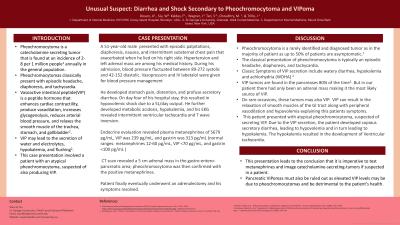Back


Poster Session E - Tuesday Afternoon
Category: Functional Bowel Disease
E0267 - Unusual Suspect: Diarrhea and Shock Secondary to Pheochromocytoma and VIPoma
Tuesday, October 25, 2022
3:00 PM – 5:00 PM ET
Location: Crown Ballroom

Has Audio
- AD
Aaron Douen, MD
Coney Island Hospital
Brooklyn, New York
Presenting Author(s)
Aaron Douen, MD, Wenchy Siu, MD, Fady Kaldas, BSc, Justin J. Wagner, DO, Samuel Tan, MD, Mohammad K. Choudhry, MD, John Trillo, MD
Coney Island Hospital, Brooklyn, NY
Introduction: Pheochromocytoma is a catecholamine secreting tumor that is found at a rate of 0.0008% annually in the general population. Vasoactive intestinal peptide, also known as vasoactive intestinal polypeptide or VIP, is a peptide hormone that enhances cardiac contractility, produces vasodilation, increases glycogenolysis, reduces arterial blood pressure, and relaxes the smooth muscle of the trachea, stomach, and gallbladder. Moreover, VIP may lead to the secretion of water and electrolytes, hypokalemia, and flushing. This case presentation involved a patient with an atypical pheochromocytoma, suspected of producing VIP.
Case Description/Methods: A 51-year-old male presented with palpitations, diaphoresis, nausea, and intermittent substernal chest pain that exacerbated when he lied on his right side. Hypertension and left adrenal mass are among his medical history. He developed emesis, stomach pain, distention, and profuse secretory diarrhea. On day 4 of his hospital stay, this resulted in hypovolemic shock due to a 5L/day output. He further developed metabolic acidosis, hypokalemia, and his EKG revealed intermittent ventricular tachycardia and T wave inversion. Plasma metanephrines were 5679 pg/mL, VIP was 239 pg/mL, and gastrin was 313 pg/mL, according to an endocrine examination. CT scan revealed a 5 cm adrenal mass in the gastro-entero-pancreatic area; pheochromocytoma was then confirmed with the positive metanephrines. Patient finally underwent adrenalectomy.
Discussion: Pheochromocytoma is a rarely identified and diagnosed tumor in the majority of patients. The classical presentation of pheochromocytoma is typically an episodic headache, diaphoresis, headache, and tachycardia. On rare occasions, these tumors may also secrete Vasoactive intestinal peptide (VIP). VIP can result in the relaxation of smooth muscles of the GI tract along with peripheral vasodilation and hypovolemia. This patient presented with atypical pheochromocytoma, suspected of secreting VIP. Due to the VIP secretion, the patient developed copious secretory diarrhea, leading to hypovolemia and in turn leading to hypokalemia. The hypokalemia resulted in the development of Ventricular tachycardia. This presentation leads to the conclusion that it is imperative to test metanephrines and image catecholamine-secreting-tumors if suspected in a patient. Pancreatic VIPomas must also be ruled out as elevated VIP levels may be due to pheochromocytomas and be detrimental to the patient’s health.
Disclosures:
Aaron Douen, MD, Wenchy Siu, MD, Fady Kaldas, BSc, Justin J. Wagner, DO, Samuel Tan, MD, Mohammad K. Choudhry, MD, John Trillo, MD. E0267 - Unusual Suspect: Diarrhea and Shock Secondary to Pheochromocytoma and VIPoma, ACG 2022 Annual Scientific Meeting Abstracts. Charlotte, NC: American College of Gastroenterology.
Coney Island Hospital, Brooklyn, NY
Introduction: Pheochromocytoma is a catecholamine secreting tumor that is found at a rate of 0.0008% annually in the general population. Vasoactive intestinal peptide, also known as vasoactive intestinal polypeptide or VIP, is a peptide hormone that enhances cardiac contractility, produces vasodilation, increases glycogenolysis, reduces arterial blood pressure, and relaxes the smooth muscle of the trachea, stomach, and gallbladder. Moreover, VIP may lead to the secretion of water and electrolytes, hypokalemia, and flushing. This case presentation involved a patient with an atypical pheochromocytoma, suspected of producing VIP.
Case Description/Methods: A 51-year-old male presented with palpitations, diaphoresis, nausea, and intermittent substernal chest pain that exacerbated when he lied on his right side. Hypertension and left adrenal mass are among his medical history. He developed emesis, stomach pain, distention, and profuse secretory diarrhea. On day 4 of his hospital stay, this resulted in hypovolemic shock due to a 5L/day output. He further developed metabolic acidosis, hypokalemia, and his EKG revealed intermittent ventricular tachycardia and T wave inversion. Plasma metanephrines were 5679 pg/mL, VIP was 239 pg/mL, and gastrin was 313 pg/mL, according to an endocrine examination. CT scan revealed a 5 cm adrenal mass in the gastro-entero-pancreatic area; pheochromocytoma was then confirmed with the positive metanephrines. Patient finally underwent adrenalectomy.
Discussion: Pheochromocytoma is a rarely identified and diagnosed tumor in the majority of patients. The classical presentation of pheochromocytoma is typically an episodic headache, diaphoresis, headache, and tachycardia. On rare occasions, these tumors may also secrete Vasoactive intestinal peptide (VIP). VIP can result in the relaxation of smooth muscles of the GI tract along with peripheral vasodilation and hypovolemia. This patient presented with atypical pheochromocytoma, suspected of secreting VIP. Due to the VIP secretion, the patient developed copious secretory diarrhea, leading to hypovolemia and in turn leading to hypokalemia. The hypokalemia resulted in the development of Ventricular tachycardia. This presentation leads to the conclusion that it is imperative to test metanephrines and image catecholamine-secreting-tumors if suspected in a patient. Pancreatic VIPomas must also be ruled out as elevated VIP levels may be due to pheochromocytomas and be detrimental to the patient’s health.
Disclosures:
Aaron Douen indicated no relevant financial relationships.
Wenchy Siu indicated no relevant financial relationships.
Fady Kaldas indicated no relevant financial relationships.
Justin Wagner indicated no relevant financial relationships.
Samuel Tan indicated no relevant financial relationships.
Mohammad K. Choudhry indicated no relevant financial relationships.
John Trillo indicated no relevant financial relationships.
Aaron Douen, MD, Wenchy Siu, MD, Fady Kaldas, BSc, Justin J. Wagner, DO, Samuel Tan, MD, Mohammad K. Choudhry, MD, John Trillo, MD. E0267 - Unusual Suspect: Diarrhea and Shock Secondary to Pheochromocytoma and VIPoma, ACG 2022 Annual Scientific Meeting Abstracts. Charlotte, NC: American College of Gastroenterology.
